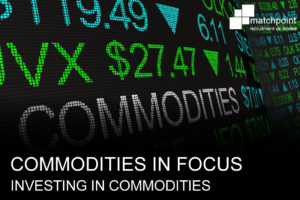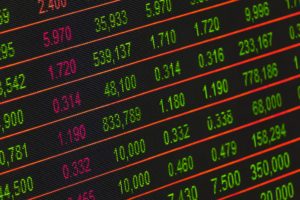

In this blog:
In our ‘Commodities in Focus’ blogs we have looked at the main types of commodities:
As well as Futures – which play a vitally important part in commodities trading.
In this latest of our Commodities blogs we are taking a closer look at the commodities investment process and how this works.

There are a range of different ways to invest in commodities
Generally speaking, commodities are highly sophisticated assets so trading and investing in them is generally not appropriate for inexperienced or retail investors.
Investing in commodities is of most interest to professional or institutional investors who manage large and diverse portfolios, directly for themselves or on behalf of their clients, or those businesses which actually need to purchase raw goods. There are some exceptions to this such as Exchange Traded Funds (see below) and some individual commodity assets like gold do attract retail investors but this is less common.
Although there are many investors who are focused on just the commodities markets, one of the main reasons that people or organisations invest in commodities is for diversification.
Most professional investors will have a range of assets including stocks, bonds, commodities and futures in a variety of forms.

Investing in a range of different assets – including commodities such as energy – helps investors to diversify
As we have discussed before in our blogs, supply and demand is probably the factor which has the most notable affect on the price of individual commodities.
Changes in the weather (affecting agricultural products) or the geopolitical environment (impacting energy and/or metals) can happen almost overnight meaning that commodity prices can be quite volatile. This is why many investors use futures contracts to invest.
There are four main ways to invest in commodities:
Buying and selling actual goods like corn, aluminium, gas or oil is how trading in commodities began. This requires complicated logistics such as transport and storage, but clearly this is a necessity for those ‘investors’ who actually need the raw products.
Investing in physical commodities is easier if you are dealing with relatively small scale assets like gold where a small amount has a high value. Gold is particularly appealing to investors for this reason and because it is a tangible asset.

Gold is a tangible asset
Another way to invest is to buy stocks in the companies which produce commodities such as mining companies, oil and gas exploration or farming and agricultural companies.
This is an indirect way to invest and can be more about the general value of the company than that of the actual commodities themselves. This can be a positive or a negative depending on the strength and value of each company. Successful commodities producers tend to be those which adapt to changing markets, like major energy companies which are now diversifying into renewables.

Many energy companies are diversifying into renewables
Futures contracts are traded on futures exchanges and are a way to invest in commodities without buying the actual assets.
Find out more in our Trading in Futures blog.

Futures Contracts offer exposure to the commodities markets
Commodity Exchange Traded Funds (ETFs) have made commodities more easily accessible as an investment.
Commodity ETFs can be related to either a particular commodity, commodity future or a commodity index. If you invest in an ETF you don’t buy into the actual commodity itself, but instead the ETF invests in either futures (see above) or asset-backed contracts which are focused on a particular index or sector.
ETFs make investing in commodities much easier than entering into individual contracts as they provide exposure without the commitment to buy the actual commodities themselves
The physical trading of commodities happens on commodities exchanges. We have looked at these before and there are many around the world.
Some commodities exchanges manage trade in a mix of commodities and some are dedicated to specific areas such as the world famous London Metals Exchange.

The Chicago Mercantile Exchange
In the US the highest profile exchange is the CME group which is made up of the Chicago Mercantile Exchange and the Chicago Board of Trade which merged in 2006.
At Matchpoint Recruitment we specialise in supporting our clients to find the right professionals for choice commodities roles.

Supporting our clients to find the right professionals
For more information – get in touch with us, or if you are looking for your next role in Commodities – register online.